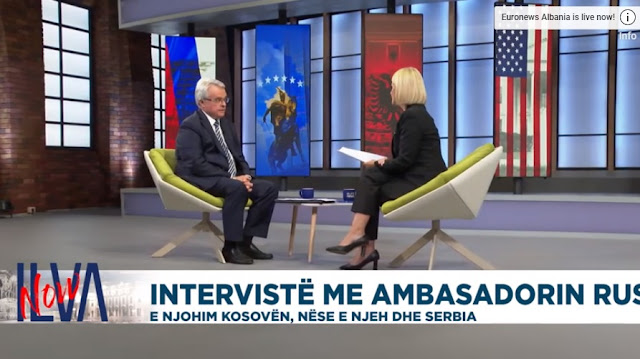 |
| Mikhail Afanasiev and Ilva Tare |
Mr. Mikhail Afanasiev, Ambassador of the Russian Federation to Albania, said in an interview with Euronews Albania that Russia had made clear its position on the recognition of Kosovo and justified that the issue should be resolved through negotiations between the two countries.
Ilva Tare: Rama also demanded in Moscow that Russia and Serbia recognize Kosovo as an independent state. Do you think Russia will ever do that?
Mikhail Afanasiev: Our country's position on the Kosovo issue is well known. Whatever anyone says, UN Security Council Resolution 1244 remains the current element of international law, which should guide UN member states in this matter. It is strange in this background to hear calls from Russia to recognize Kosovo's "independence." Perhaps this call should be addressed to some EU countries, membership of which is Albania's top priority? That would be more logical.
It is important that this issue is resolved directly between the stakeholders within the framework of the negotiation process. Only a compromise solution will be sustainable, capable of guaranteeing stability and security in the region. We also believe that one of the preconditions for resolving the issue is the continued attention of the UN Security Council on Kosovo. The final solution to the Kosovo issue must be supported by the UN Security Council by adopting a new resolution to replace the current resolution 1244.
Ilva Tare: In official Tirana and Pristina, at the time of the intervention in Crimea is been noticed that the precedent of Kosovo was mentioned by official Moscow. So, on the one hand, it was a precedent that Russia accepted, but on the other hand, it does not recognize Kosovo's independence. Is this the double standard?
Mikhail Afanasiev: The events of 1999 are part of history, but not of a distant history, which still continues to affect the situation in the region. It was these events that led to the adoption of Resolution 1244 after the well-known aggression of NATO countries against the Federal Republic of Yugoslavia and the de facto partition of Kosovo. The issue of provincial status has not yet been resolved, and we always return to the need to find a solution based on the norms of international law, the source of which is the UN Charter and Security Council decisions. Recently, our Western partners have tried to dictate to the parties some "rules" that distort current international law. These are efforts to steer international relations in Kazakhstan.
Ilva Tare: It has been made public that Foreign Minister Lavrov will visit Belgrade a few days before the Serbian elections. Is it normal for such a high-level diplomatic visit to a country where there are parliamentary elections?
Mikhail Afanasiev: Yes, today I saw the announcement of Lavrov's next visit to Boegrad on June 18 this year. The talks will focus on bilateral relations. I have no other information on the agenda.
As for the purposes and timelines of this visit, it is not my job as a diplomat to evaluate them. Media representatives have freedom of action here.
Ilva Tare: What does Russia want in the Balkans? What is Russia's goal for the Balkan countries? Is not a secret Russia's close relations with Slavic countries or those with the Orthodox majority.
Mikhail Afanasiev: The Balkan Peninsula is important for Russia. We do not hide this. Russia has long been present in the Balkans, not for the last 30-40 years, but for centuries. It would be wrong to say that we develop relations only with the Orthodox countries, as one of our biggest partners is mainly Turkey. Of course, we have close relations with Greece. The countries of the former Yugoslavia are also among our successful partners. Therefore, it cannot be said that Russia has a selective orientation towards certain countries in the region. With someone, the relationship is better, with someone else not so much. Russia is interested in peace, stability, tranquility and economic prosperity in this region, which is not far from our borders. For us, this is important both from the point of view of our security and from the point of view of economic cooperation, with mutual benefit, with all the countries of the region. We are all neighbors, part of a region where the Black Sea lies, by the way, Albania is also a member of the Black Sea Economic Cooperation Organization. We are partners in pan-European organizations, such as the OSCE. All countries in the region aim to join the EU, which is Russia's largest economic partner. From this point of view, peace, stability and cooperation are our only interests in the Balkan region..
